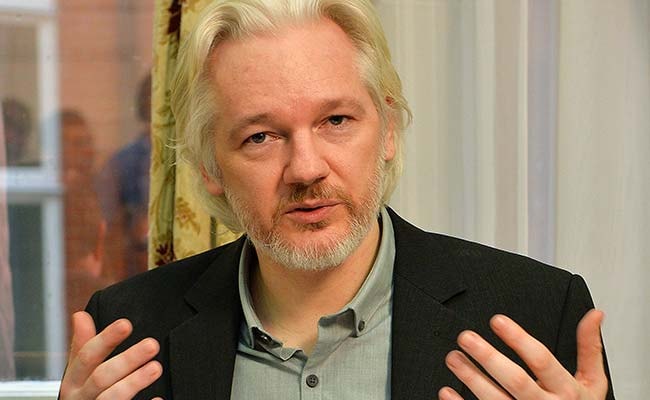
File Photo: WikiLeaks founder Julian Assange. (AFP)
Quito:
Ecuador said on Wednesday the British government has refused to let WikiLeaks founder Julian Assange receive medical attention outside the Andean country's London embassy where he has been holed up for over three years.
Foreign Minister Ricardo Patino said Ecuador asked Britain for a special "safe-passage" so that Assange, 44, could have a magnetic resonance imaging scan because he has suffered "deep pain" in his right shoulder for the last three months.
"The British government is not offering the terms to make this happen," Patino told journalists. "It's an additional fault in his protection, in the defence of a person's human rights."
"This is a person who needs to have exams done to understand the situation given it is grave," he said. "We don't know what he may have, and they don't want to give an authorization that they can perfectly well give."
Assange, who is Australian, entered the embassy in June 2012 to avoid being extradited to Sweden, where he is wanted for questioning over a rape allegation, which he denies.
Assange says he fears Sweden will extradite him to the United States where he could be put on trial over WikiLeaks' publication of classified military and diplomatic documents five years ago, one of the largest information leaks in U.S. history.
Britain has accused Ecuador of preventing the course of justice by allowing Assange to remain in its embassy in the upmarket central London area of Knightsbridge.
Britain's Foreign Office said the head of its diplomatic service had summoned the Ecuadorean ambassador on Monday to "register once again our deep frustration at the protracted delay."
Ecuador in August agreed to discuss a general bilateral accord with Sweden on legal assistance in criminal matters, thereby providing a potential opening for Swedish prosecutors to question Assange.
Foreign Minister Ricardo Patino said Ecuador asked Britain for a special "safe-passage" so that Assange, 44, could have a magnetic resonance imaging scan because he has suffered "deep pain" in his right shoulder for the last three months.
"The British government is not offering the terms to make this happen," Patino told journalists. "It's an additional fault in his protection, in the defence of a person's human rights."
"This is a person who needs to have exams done to understand the situation given it is grave," he said. "We don't know what he may have, and they don't want to give an authorization that they can perfectly well give."
Assange, who is Australian, entered the embassy in June 2012 to avoid being extradited to Sweden, where he is wanted for questioning over a rape allegation, which he denies.
Assange says he fears Sweden will extradite him to the United States where he could be put on trial over WikiLeaks' publication of classified military and diplomatic documents five years ago, one of the largest information leaks in U.S. history.
Britain has accused Ecuador of preventing the course of justice by allowing Assange to remain in its embassy in the upmarket central London area of Knightsbridge.
Britain's Foreign Office said the head of its diplomatic service had summoned the Ecuadorean ambassador on Monday to "register once again our deep frustration at the protracted delay."
Ecuador in August agreed to discuss a general bilateral accord with Sweden on legal assistance in criminal matters, thereby providing a potential opening for Swedish prosecutors to question Assange.
© Thomson Reuters 2015
Track Latest News Live on NDTV.com and get news updates from India and around the world

